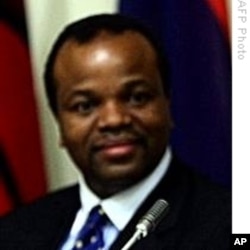A former Swaziland prime minister has called on the country to embrace democracy ahead of the opening of the Common Market for Eastern and Southern Africa (COMESA) heads of state and government summit Tuesday in the Swazi capital, Mbabane.
Obed Dlamini said Swazis cannot call for significant infrastructural and nationwide development while keeping out political development in the tiny southern African country.
“My expectations are very high, and I have no doubts, (we) will benefit a lot. (And,) not only that, they would be in touch with other fellows from (all over) Africa, especially the members of COMESA. That will also go for other friends from elsewhere, especially investors. And, I hope the politicians will come up with some resolutions towards African development, in particular within COMESA in the area of trade,” he said.
Several heads of state have arrived in Swaziland to participate in the three-day 14th COMESA summit of the heads of state and government.
According to organizers, topics of discussion include developments on a regional integration agenda, including progress towards full implementation of the COMESA Customs Union, the tripartite cooperation between COMESA, the East African Community and the Southern African Development Community (SADC), and how the region can enhance the use of science and technology for the benefit of its people.
Swaziland’s King Mswati III is expected to take over the COMESA chairmanship from the Zimbabwe President Robert Mugabe during the summit.
Former Prime Minister Dlamini said Swaziland’s political leaders should take into account the growing democracy practiced in the sub-region and copy what is relevant to them.
“As you are aware, Swaziland is one of the least in terms of development, comparatively. But, when we have fellows coming from as far as Egypt, there would be some cross-pollination of some sort. I believe the exchange of views will affect not only our economic performance, but it will also affect our political performance as well,” Dlamini said.
Analysts say, although a constitution has been reintroduced in Swaziland, the level of power invested in King Mswati III is so significant that the country can be considered an absolute monarchy.
Swaziland has banned all forms of political parties in the kingdom. Critics and human right groups say the government often uses state institutions, including the security agencies and the judiciary, to intimidate and harass opponents. The government denies the accusations.









